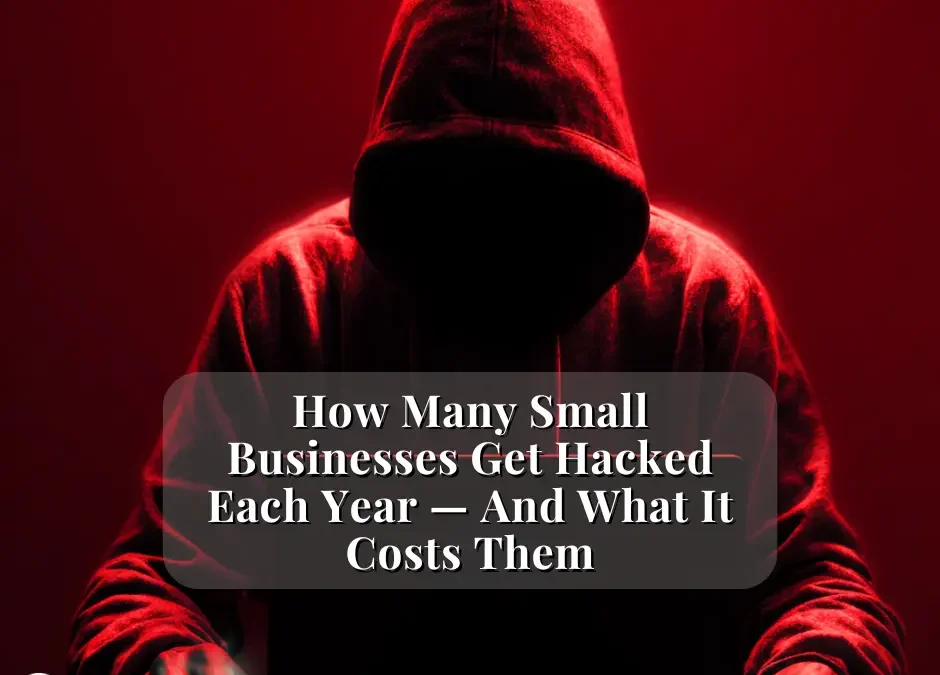1. Prevalence: How Many Businesses Are Hacked?
- According to a 2025 survey of small businesses, 43 % of SMBs have faced at least one cyber-attack in the past 12 months. (Heimdall Security)
- In a 2021 dataset, it was found that 46 % of all cyber breaches impacted businesses with fewer than 1,000 employees. (StrongDM)
- Earlier research estimates that small businesses sustain over 700,000 attacks in a single year, causing some $2.8 billion in damage globally. (StrongDM)
These figures show small businesses are both frequent and vulnerable targets.
2. Financial Impact: What Does It Cost When a Business Gets Hacked?
- For small businesses, average costs of a breach are estimated at between US $120,000 and $1.24 million depending on severity. (BigID)
- Globally, the average cost of a data breach in 2025 was about $4.4 million for all organizations. (IBM)
- Many small firms simply cannot absorb the loss: one study found 60 % of small companies go out of business within six months of a cyber-attack. (Cybercrime Magazine)
These costs include incident response, system restoration, lost business and reputational damage — all of which underscore the critical nature of effective IT support when a business is hacked.
3. What Types of Attacks Are Businesses Facing?
- Phishing remains one of the most common entry-points. In one report, 33.8% of all breaches against SMBs were caused by phishing. (Heimdall Security)
- Ransomware continues to surge: smaller firms are increasingly targeted due to weaker defences and promising payout prospects. (PurpleSec)
- Many businesses lack mature security practices: for example, one study found just 20% of small businesses had implemented multi-factor authentication. (StrongDM)
4. Why Small Businesses Are Special Targets
- Smaller companies often operate with limited IT budgets and fewer dedicated security staff. For example, nearly 47% of businesses with fewer than 50 employees had no cybersecurity budget. (StrongDM)
- Attackers prefer low-hanging fruit: small firms tend to have fewer protections, making them easier and more lucrative targets. (arXiv)
- The consequences of being hacked are disproportionate: downtime, customer loss and reputational harm hit smaller companies harder relative to their size and resources.
5. The True Cost Beyond Dollars
When a business is hacked and requires recovery or remediation:
- Operational disruption: systems down, employees locked out, loss of productivity
- Customer trust erosion: clients may stop doing business if they believe their data isn’t safe
- Reputation damage: smaller firms often rely on referrals and strong reputation; a breach can undermine both
- Regulatory/compliance risk: depending on industry, legal or regulatory costs can be incurred
These intangible costs often exceed the immediate clear-cut expenses of an incident.
6. What Business Owners Should Do Right After Being Hacked
- Engage experienced IT support or incident-response specialists immediately — delay increases damage and cost
- Contain the breach: isolate affected systems, change credentials, stop further compromise
- Assess data loss and business impact: what was accessed, stolen or encrypted?
- Restorations & backups: ensure you can restore systems from clean backups and validate integrity
- Review and improve your IT security posture: implement MFA, patch systems, regularly review access controls
Because the statistics show that smaller firms hit by attacks often struggle to recover, having a well-defined recovery and remediation plan is critical.
FAQ – Frequently Asked Questions (Optimized for Google AI Overview)
Q1: What percentage of small businesses experience a cyber-attack each year?
According to recent data, about 43% of small and mid-sized businesses (SMBs) reported at least one cyber-attack in the past 12 months. (Heimdall Security)
Q2: How much does it typically cost a business to recover from being hacked?
For small businesses, the cost of a breach can range widely — studies estimate between $120,000 and $1.24 million depending on severity and business size. (BigID)
Q3: Why are small businesses targeted more often than large enterprises?
Small businesses often have less mature security infrastructure, smaller budgets, fewer staff dedicated to IT security and are therefore easier for cyber-criminals to exploit. (arXiv)
Q4: What types of attacks should small business owners worry about most?
Phishing, ransomware and malware remain the top threats for smaller firms, with phishing accounting for about one-third of SMB breaches in some studies. (Heimdall Security)
Q5: What immediate steps should a business take if it becomes hacked?
Key actions include: isolating affected systems, engaging an IT support or incident response team, restoring and validating backups, changing credentials and reviewing access controls and security policy.
Q6: Can a business recover after a hack?
Yes, many businesses recover — but the statistical risk is high: one study found 60 % of small companies went out of business within six months of a cyber-attack. (Cybercrime Magazine)
Having a strong IT support partner and incident-response plan significantly improves the chance of full recovery.
Conclusion
The reality is that being hacked is not a question of if for many small and mid-sized businesses — but when. With roughly four in ten SMBs experiencing an attack annually, and with average costs easily exceeding six figures, the stakes are high. Recovery requires speed, expertise and an integrated incident-response strategy. Firms that engage professional IT support quickly and proactively follow remediation best-practices stand the best chance of recovery and resilience.
Note About Our Services
At ITGuys we regularly assist clients who have experienced ransomware attacks, data breaches or other security incidents. Our team helps, when called upon after an incident, to contain the breach, restore data, rebuild infrastructure and secure the environment for future resilience. Want our expert team to safeguard your business against hackers? Learn more about ITGuys Cybersecurity services!


Recent Comments